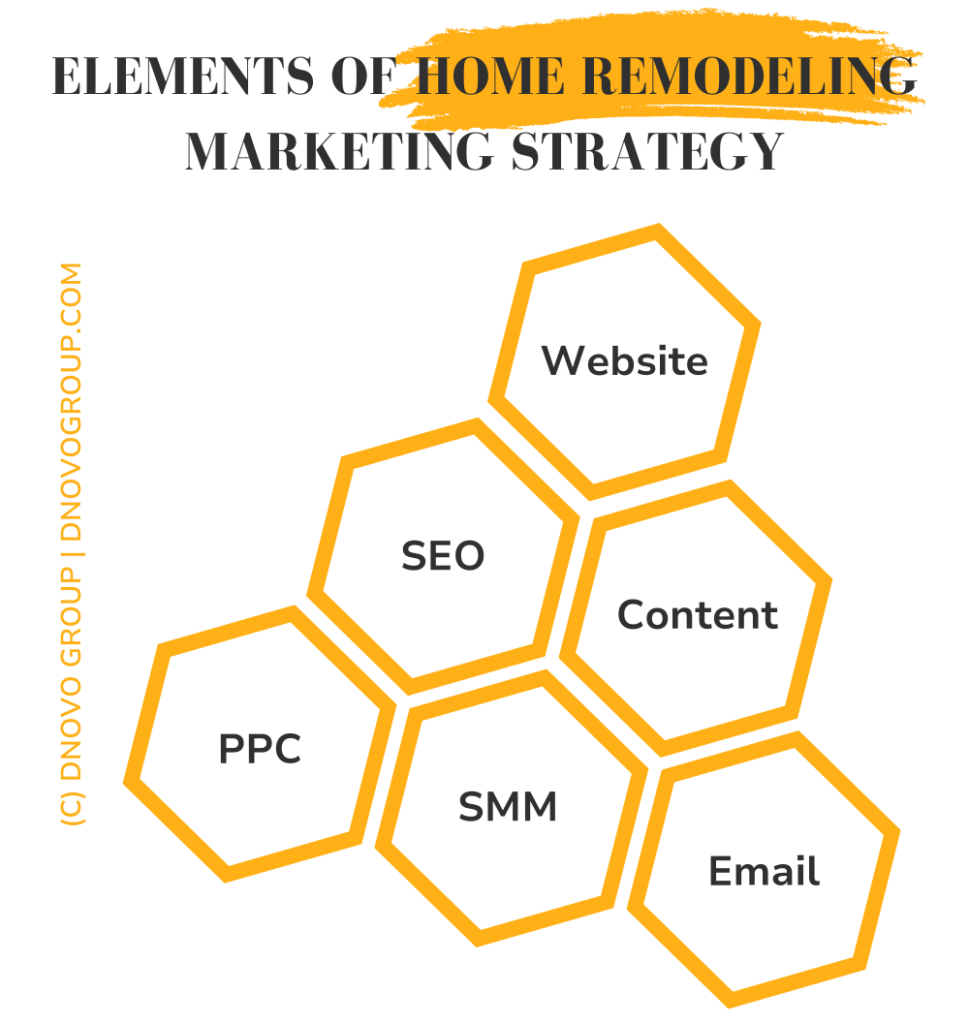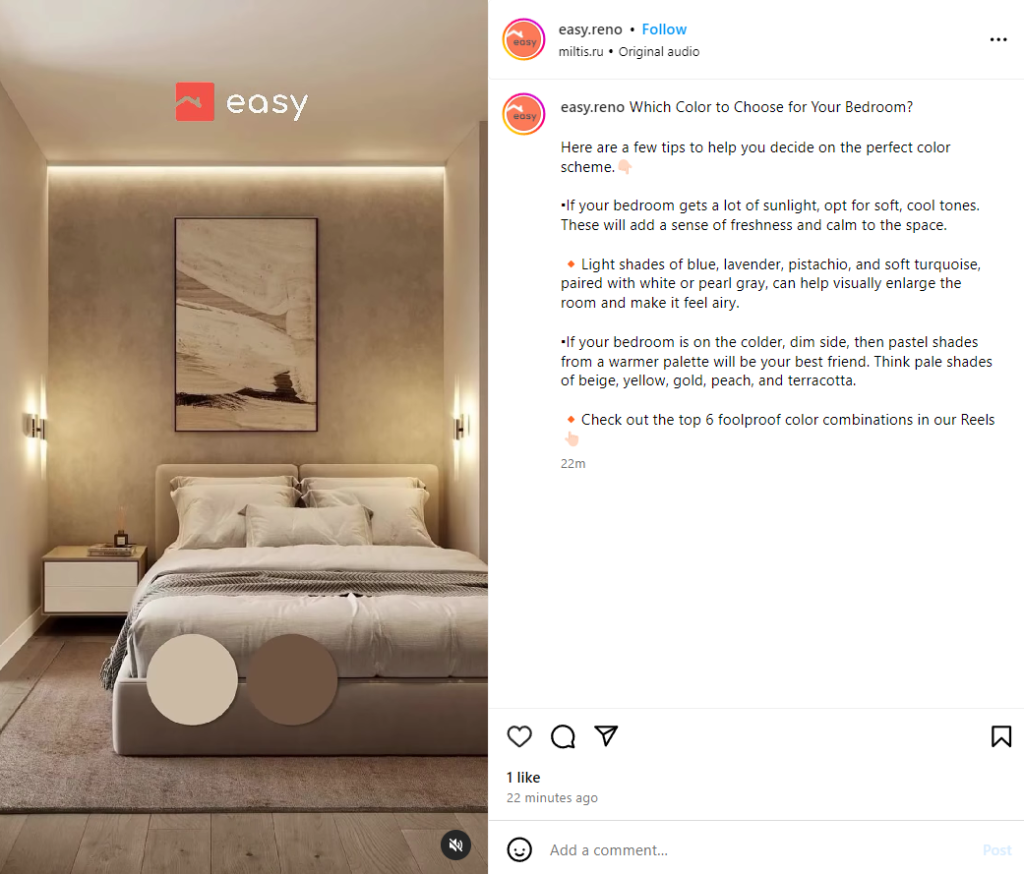Home Remodeling Marketing
Home Remodeling Marketing Strategy
In the current economy, remodeling companies have a hard time finding new customers. With the record-high interest rates, people are reluctant to spend time on home renovations. In the long run, the current situation can cause businesses to close if they do not adapt to severe competition.
One of the best ways to not only survive the crisis but also to grow is to change customer acquisition and retention. In many cases, remodeling contractors do not have a strategic vision or any plan for these activities.
As a result, their customer acquisition is chaotic and heavily depends on word of mouth and sheer chance. It’s not the right approach for an economic recession we’re currently living in.
Home remodeling marketing can fix this issue, bringing your customer acquisition and retention the much-needed structure and regularity.
Created by dNOVO Group home remodeling marketing experts, this guide will equip you with all the knowledge necessary to grow your business. You will build a marketing funnel, revamp your marketing efforts, boost your sales and increase your revenues.
Key Elements of Home Remodeling Marketing Strategy
An efficient digital marketing strategy for a home remodeling company requires several tactics working together in unison. These are:
- Website
- SEO
- Content
- SMM
- PPC
- Email campaigns

In the following sections, we’ll take a closer look at each of these elements of a home remodeling marketing strategy.
Digital Marketing Guides for Contractors
Quickly, before we begin, there’s one more thing, we’d like to discuss. This guide is one among many in the series created specifically for contractors. We requested our best marketing strategists to create comprehensive guides in marketing and SEO to help businesses to survive the recession and grow.
Here are other guides in the series:
- Roofing Marketing
- Roofing SEO
- Contractor Marketing
- Contractor SEO
- Construction Marketing
- Construction SEO
- Landscaping Marketing
- Landscaping SEO
- HVAC Marketing
- Plumbing Marketing
- Windows & Doors Marketing
Share it with other contractors who might need them. Now let’s get back to our home remodeling marketing guide. We start with:
Remodeling Company Website
Website is the basis of your digital marketing efforts. It is the center point of your lead generation. Attract potential customers to your website with PPC campaigns and SEO work. Convert them with high-quality content and smart CTAs.
When planning the website for your remodeling business, plan the following pages and elements:
1. Home Page
A home page is a short recount of what your remodeling company does, your unique selling point, and why it’s the best your target audience can find.

2. Remodeling services pages
Service pages are important landing pages for your SEO and PPC campaigns. They increase your chances of ranking higher for specific keywords.
3. Contact page, CTAs, and widgets
Make it easy for potential customers to convert. Don’t limit yourself to just a contact page. Create request appointment widget that can be reached from any page with just one click on a CTA. Don’t forget to provide your phone number in the header and footer of each page.
4. Service area pages
Service area pages are great for local SEO. They also boost general SEO on the whole. They can become landing pages for your Google ads.
5. Gallery
Share your completed remodeling projects in a gallery. People like before and after photos, they can convert remodeling leads into actual customers.

6. Menu
The menu is essential for easy navigation along your website. It also helps with interlinking and SEO.
7. Blog
The blog is necessary to support the SEO of your service pages and service area pages. Create blogs on various topics related to remodeling projects and place links to your service pages there.
8. Positive reviews
Encourage customers to leave positive reviews on your Google Business Profile and in various business listings. Next, showcase these reviews and ranks on your website. It will help build the trust of your potential customers.

Search Engine Optimization
Search Engine Optimization is one of the most efficient methods for remodeling companies to gain new customers. Through meticulous daily work, SEO teams make sure that potential leads can find your website online.
In this section, we discuss the basics of SEO strategy for remodeling businesses.
Keyword Research
Your potential customers use various keywords to look for remodeling services online. Keywords differ in several parameters that you need to take into account when doing the keyword research:
- the number of searches per month, i.e., volume;
- the difficulty of getting to the top of search results;
- the intent that people have when looking for a keyword;
- length (short-tail & long-tail keywords);
- the role in content (focus keyword and LSI keywords).
If you want your website to rank in search engine results for a certain keyword, you must create a dedicated content piece. On the surface, it might seem that you need to focus your efforts on keywords with high volume.
In practice, such keywords can have high difficulty and informational intent. Let’s take the word remodeling for example. It has a decent volume. However, it’s difficult to target and you’ll need at least 93 backlinks.

If you look at the search results, you will see that you’ll compete with websites like Wikipedia and large news outlets. To win them over, you’ll need to invest a lot of time and money into it. The keyword with informational intent isn’t worth the investment.
That’s why choosing a keyword with lower difficulty and/or different intent (commercial or transactional) can help you immensely.
For example, kitchen remodeling has a higher volume, slightly lower difficulty and commercial intent. People with this intent usually look into the providers of remodeling services.

Finally, you can play with the word itself, since there are several ways you can write it. Though Canadians have a strong preference for remodeling over remodelling, there are still cases when they use the second version.
You can also use the shorter version of this keyword, for example, kitchen remodel price:

The screenshots above are just one example of looking for a suitable keyword for search engine rankings. You need to do this type of work for multiple keywords.
On-page SEO
Once you’ve chosen your keyword and created a dedicated piece of content, you need to place it strategically on your website page.
Here’s the list of places for your focus keyword:
- Title of the page (H1)
- The first paragraph of the text
- One keyword per 100 words of the text
- At least one subheading of the second level (H2)
- URL
- Meta title and meta description
- Alt texts of images.
On-page SEO helps search engines to identify the topic of your page. Remember, that crawlers will also look for the LSI keywords. These are keywords that are related to the focus keywords. For example, if you create a page for bathroom remodeling services, here are some LSIs that Google will look expect to see in your text:

Technical SEO
Search engines assess websites not only by the keywords but also by the UX they provide to website visitors. Out of two websites with content of similar quality, they will rank higher the one with better performance.
That’s why your remodeling business needs to pay special attention to technical SEO. Here are six tips to improve your website UX:
- Create mobile version
- Create an easy-to-understand website architecture.
- Improve navigation by interlinking, pagination, breadcrumbs and menu.
- Avoid page cannibalization by removing duplicate content and creating canonical tags.
- Help crawlers by creating redirects, sitemap XML and robots TXT, and indexing pages.
- Increase website speed by switching to WEBP image format, changing domain provider, and cleaning your code.
These simple things will not only get you better rankings but also improve the experience of your potential clients.

Off-page SEO
Search engines rank higher on pages that other websites consider authoritative. It’s especially critical for competitive markets like remodeling industry.
Authority is achieved by backlink acquisition. Backlinks are links that are placed on other websites and refer to your website. Not all backlinks are equally valuable.
Pages dedicated to home remodeling have more impact than pages dedicated to unrelated topics. Online encyclopedias, news outlets, journals, and other remodeling contractors are also good sources of backlinks.
However, links from websites of dubious reputation can be harmful. That’s why, you’ll need to pay special attention to all your backlinks. You’ll need to reach out to website owners to get good backlinks and request link disavows in Google Search Console for malicious ones.
Local SEO for Remodeling Contractors
Since the majority of companies in remodeling industry are local businesses, their area of operation is limited. To avoid clients outside your service area, we suggest Local SEO.

Local SEO benefits for a remodeling contractor include:
- Attracting high-quality remodeling leads.
- Not wasting resources on potential clients outside your area of service
- Competing more easily as a local business compared to nation-wide or international competition.
Local SEO comprises two practices:
- Using keywords with the names of locations
- Creating a Google Business Profile
Google Business Profile is great for local businesses. It enables a remodeling company to appear on Google Maps and in local searches. People will see your business hours, contact details, and can build a route to your office if they want to visit.

Content Marketing Strategy for Remodeling Companies
To convert potential customers into real ones, your remodeling business needs high-quality content. Webiste content must attain several goals:
- Support SEO efforts
- Educate target audience
- Build trust
- Convert leads
Your content strategy will comprise of the following activities:
- Create website pages
- Write blogs
- Optimize the old content
Content Clusters

Content strategy should be based on the keywords your remodeling company chose for its website. Before discussing how to pick content topics and plan content strategy, we’d like to discuss clusters.
They play an important role in search engine marketing. That’s why if you want to succeed in your content marketing strategy, we highly recommend using them in your work.
Clusters are pieces of content within a website that are interlinked and related by one topic. Each cluster has a central content piece to which all other content pieces refer.
Usually, a service page or a service area page is the central content of the cluster. For example, you have a kitchen remodeling service page. You can also create blog posts related to this topic like:
- 10 kitchen remodeling ideas in 2025
- best floor for kitchen remodeling
- kitchen remodeling DIY
- worst kitchen remodeling projects to learn from

There are three ways you can go about clusters. First, you can create a cluster as a whole over some period of time. Second, you can create centrepieces for each cluster independently and then create supporting content cluster by cluster.
Finally, you can create service pages and then fill each cluster bit by bit. We suggest against the first practice since it might take a while before you finalize the cluster. Service pages should always take priority in your content creation plan, speaking of which.
Content Plan
A content plan is a document containing the essential information about the content your team is planning to create. Such information includes but isn’t limited to the following:
- focus keyword
- content title
- content type (service page, blog, pdf, etc.)
- links to text and images
- steps in content piece creation
- people in charge of each step
- link to the published content on website & social media platforms

The steps in content creation are:
- choose the focus keyword and LSI keywords
- write content and metadata (meta title and meta description)
- create images to support content
- proofread and edit content
- stage content on the page
- on-page SEO
- publish content
- share content on social media platforms
- edit and optimize content based on its performance
How to Choose Content Topics for the Remodeling Industry
In this section, we give basic tips on how to choose content topics for service pages and blogs.

- Take your keywords and distribute them for pages and blogs.
- Create a list of FAQs of your existing customers.
- Check your direct and indirect competition for content ideas.
- Look at home remodeling forums and see what people discuss there.
Writing the answers to the clients’ FAQs and sharing your insights on the topics people discuss online will help you create a list of topics to write about.
Social Media Marketing
SMM is one of the most effective marketing strategies for a remodeling contractor.
Benefits of social media marketing for your home remodeling company:
- Provides you with backlinks from high-authority websites.
- Gives your website traffic.
- Your posts can become viral.
- Your social media followers can share your posts.
- Happy customers can tag your business in their posts.
- People can leave online reviews on your socials.
- You can reach out to potential clients.
- Content can be reusable without punishment.
Which social media platforms to choose

Choosing a social media platform you need to understand your customers and the type of content you are willing to share. For example, if your target audience is predominantly baby boomers, going to TikTok doesn’t make much sense.
If you aren’t ready to commit to creating regular videos, we also suggest avoiding platforms like YouTube. If you don’t think you can create visually appealing photos on a regular basis, Instagram might also be out of reach.
What content to share on social media
- Photos and videos of completed projects
- Photos and videos of your work in progress
- Links to your website pages and blog posts
- Special offer announcements
Pay Per Click for Home Remodeling Business
Pay-per-click is one of the most efficient digital marketing strategies. Many campaigns have shown 200% ROI which is an exceptional result for a marketing campaign.
Pay-per-click is an advertising strategy that requires you to only pay when people click on your banner ad.
Types of PPC:
- Social media ads
- Google ads
- Website ads
- Local services ads.
Google ads are one of the most popular types, since many website owners now choose to work with Google and other ad providers rather than search for clients directly.
Benefits of PPC:
- High ROI
- Target audience segmentation
- Getting traffic before SEO kicks in
- Getting before the organic results in the SERP
Example of PPC landing page:

Steps in planning PPC campaign:
- Set up campaign goals
- Allocate budget
- Choose PPC provider
- Choose audience segment
- Create (or choose) landing page
- Set up campaign tracking
- Launch campaign and track results
- Tweak campaign.
Email Marketing Strategy
Email marketing is a great lead generation and customer retention strategy for a remodelling business. One of the major benefits of email marketing is the opportunity to warm up leads and retain existing customers.
Email Marketing Step-by-Step
In this section, we will discuss how to carry out an email marketing campaign.
Step 1. Plan your email marketing campaing
As we mentioned before there are three ways you can leverage email: customer acquisition, lead warm-up and retention.
You can segment your audience and create 3 separate campaigns. Warm-up and retention campaigns can actually be merged into one if you don’t have enough resources. We suggest starting with only one campaign. This way you can see what works and what doesn’t.
Step 2. Acquire the tech stack
There are plenty of online tools that can help you do mass send-outs to a list of contacts on a regular basis. At this stage, you should also test the send-out and program the email sequence.
Step 3. Acquire email contacts

There are two main ways to acquire contact data of potential customers. First, you can buy lead lists from a third-party provider. Second, you can collect this data on your website. All you need is a good widget with a mandatory email field.
Step 4. Send out your first email sequence
You can then tweak the sequence and get better results.
3 Digital Marketing Ideas to Boost Your Lead Generation
In this section, we discuss three marketing ideas that will help you generate leads more efficiently.
1. Make a Profile on Business Directories
People are actively using online business directories to look for contractors. The common understanding is that directories check businesses before listing them. Also, they have unbiased online reviews that can help people make the right choice.
The benefits of business listings for a remodeling contractor include:
- Backlinks from reputable website
- Boosting your online reputation
- Traffic to your website
- More leads, especially high-quality leads.
2. Remember about Traditional Marketing Strategies
In the digital era, it’s easy to forget about traditional marketing focusing entirely on your online visibility. However, you should never underestimate the power of century-proven traditions.
Home remodeling Marketing tactics that still work:
- Door hanger ads.
- Direct mail.
- Leaflets.
- Street banners.
- Participation in community events.
- Partnering with local businesses.
3. Hire Remodeling Marketing Agency
Building and implementing marketing strategies for an SMB can be hard. When it comes to remodeling contractors, more often than not, it’s the business owner who does the majority of the work. Meanwhile, hiring a large in-house team is rarely cost-efficient.
The remodeling marketing agency can help you build and implement marketing strategies, boost your online visibility, attract prospective clients, and grow conversions.
dNOVO Group has years of experience in growing online sales for remodeling contractors through organized and cost-efficient marketing efforts.
Are you ready to grow your remodeling business?



